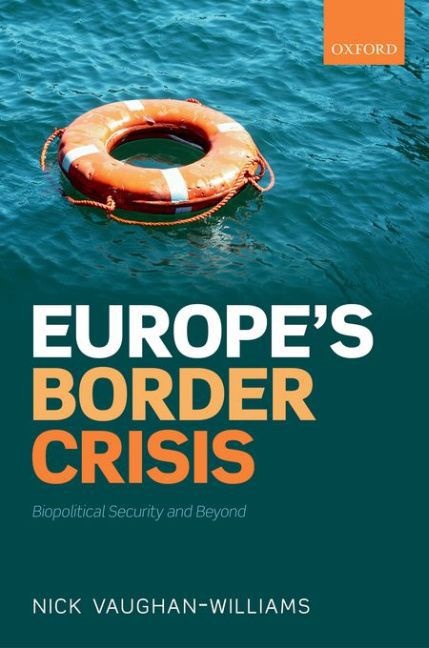Read more
Zusatztext Nick Vaughan-Williams' book offers an intellectually stimulating and conceptually challenging and rich discussion of what he terms 'Europe's border crisis.' In view of tragic deaths and human suffering at European/ EU external borders, this book makes a timely intervention in academic and non-academic debates on the controversial politics and paradoxical effects of EU border and migration policies and practices at diverse scales and spaces. Informationen zum Autor Nick Vaughan-Williams is Professor of International Security and Head of the Department of Politics and International Studies at the University of Warwick, UK. From 2016 to 2019 he holds the Philip Leverhulme Prize for outstanding research in Politics and International Relations. His programme of research, supported with grants from the British Academy, UK Economic and Social Research Council, and Leverhulme Trust, focuses on the relationship between sovereignty, subjectivity, and the spatial dimensions of security particularly the changing nature of borders and bordering practices in global politics. His book Border Politics: The Limits of Sovereign Power (2009, 2012) was Gold Winner of the Association for Borderlands Studies Book Award. He is co-author of Critical Security Studies: An Introduction (2010, 2014) and Everyday Security Threats: Perceptions, Experiences, Consequences (2016). Klappentext Europe's Border Crisis explores current dynamics in EU border security and migration management. Zusammenfassung Europe's Border Crisis investigates dynamics in EU border security and migration management and advances a path-breaking framework for thought, judgment, and action in this context. It argues that a crisis point has emerged whereby irregular migrants are treated as both a security threat to the EU and as a life that is threatened and in need of saving. This leads to paradoxical situations such that humanitarian policies and practices often expose irregular migrants to dehumanizing and lethal border security mechanisms. The dominant way of understanding these dynamics, one that blames a gap between policy and practice, fails to address the deeper political issues at stake and ends up perpetuating the terms of the crisis. Drawing on conceptual resources in biopolitical theory, particularly the work of Roberto Esposito, the book offers an alternative diagnosis of the problem in order to move beyond the present impasse. It argues that both negative and positive dimensions of EU border security are symptomatic of tensions within biopolitical techniques of government. While bordering practices are designed to play a defensive role they contain the potential for excessive security mechanisms that threaten the very values and lives they purport to protect. Each chapter draws on a different biopolitical key to both interrogate diverse technologies of power at a range of border sites and explore the insights and limits of the biopolitical paradigm. Must border security always result in dehumanization and death? Is a more affirmative approach to border politics possible? Europe's Border Crisis sets out a new horizon for addressing these and related questions. Inhaltsverzeichnis Part 1 Borders, crises, critique 1.: Europes border crisis 2.: European border security and the crisis of humanitarian critique 3.: Conceptual crises in critical border and migration studies 4.: Key themes and a map of the study Part 2. Biopolitical borders 5.: Introduction 6.: European border security and migration management: from Schengen to the Arab Spring 7.: Foucault and the biopolitical paradigm 8.: Biopolitical border security in Europe Part 3. Thanatopolitical borders 9.: Introduction 10.: The sovereign ban and thanatopolitical spaces 11.: Reassessing Agamben in critical border and migration studies 12.: Push-backs and abandonment in the European borderscape Part 4. Zo...
List of contents
- Part 1 Borders, crises, critique
- 1.: Europes border crisis
- 2.: European border security and the crisis of humanitarian critique
- 3.: Conceptual crises in critical border and migration studies
- 4.: Key themes and a map of the study
- Part 2. Biopolitical borders
- 5.: Introduction
- 6.: European border security and migration management: from Schengen to the Arab Spring
- 7.: Foucault and the biopolitical paradigm
- 8.: Biopolitical border security in Europe
- Part 3. Thanatopolitical borders
- 9.: Introduction
- 10.: The sovereign ban and thanatopolitical spaces
- 11.: Reassessing Agamben in critical border and migration studies
- 12.: Push-backs and abandonment in the European borderscape
- Part 4. Zoopolitical borders
- 13.: Introduction
- 14.: Borderwork and contemporary spaces of detention in Europe
- 15.: Critical infrastructure, dehumanization, animalization
- 16.: Derridas zoopolitics and the bestial potential of border security
- Part 5. Immunitary borders
- 17.: Introduction
- 18.: Life, politics, and immunity in Esposito
- 19.: The immunitary paradigm
- 20.: Reconceptualizing the border as an immune system
- Part 6. Affirmative borders
- 21.: Introduction
- 22.: Affirmative biopolitics
- 23.: Towards an affirmative biopolitical border imaginary
- 24.: Affirmative headings for European border security and migration management
Report
Europe's Border Crisis is a work of great interest, which integrates socio-political and philosophical analysis. Drawing on biopolitical paradigms in contemporary political philosophy, it finds keys for interpreting current dynamics within immigration policies and their antinomic consequences. It is a useful and original book that progresses research in this field of study. Roberto Esposito, Scuola Normale Superiore, Pisa

